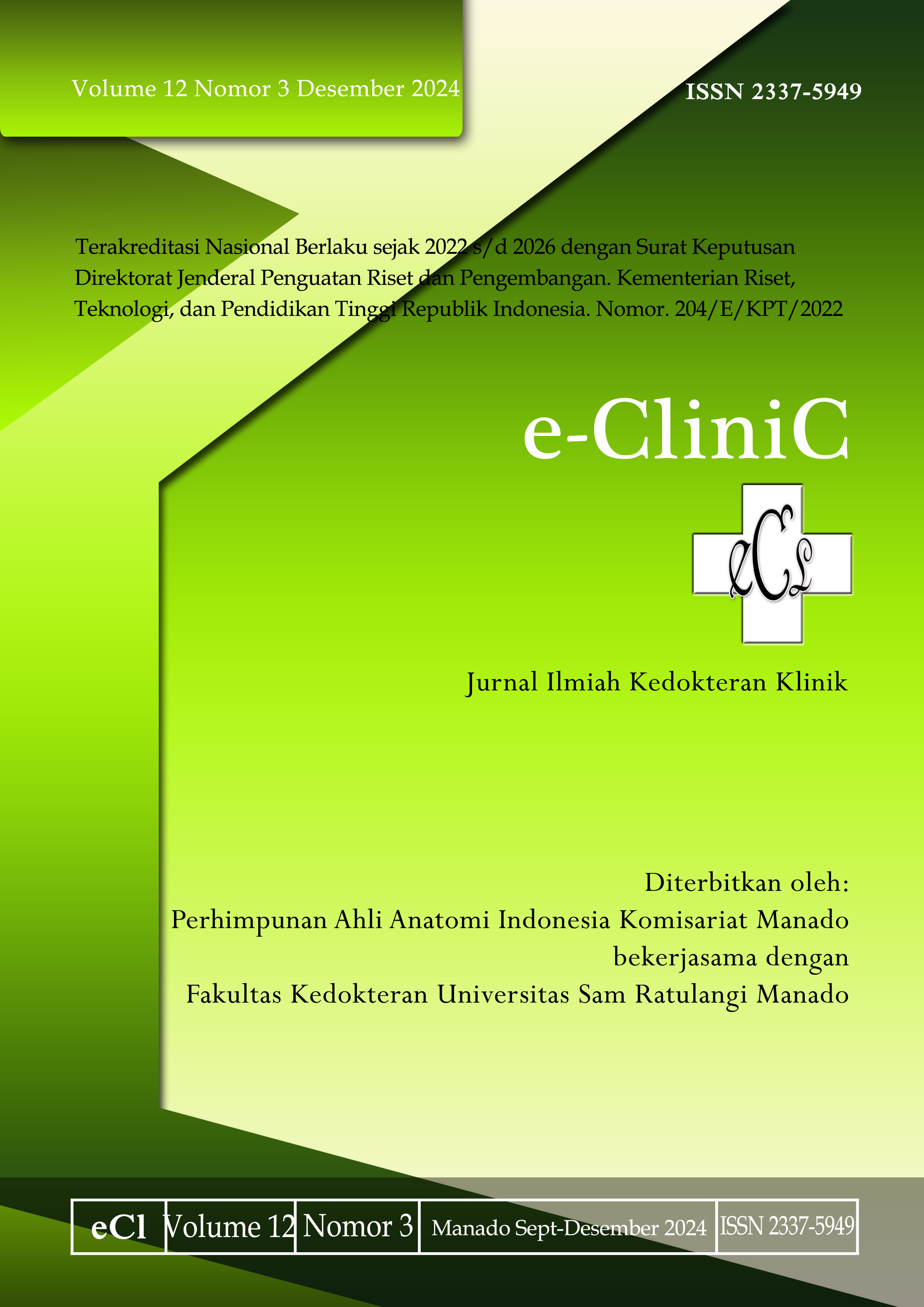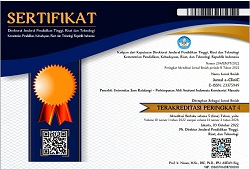Persepsi Mahasiswa terhadap Objective Structured Clinical Examination (OSCE) Fakultas Kedokteran Universitas Sam Ratulangi 2023
DOI:
https://doi.org/10.35790/ecl.v12i3.54913Abstract
Abstract: Objective Structured Clinical Examination (OSCE) is a case scenario-based assessment method expected to be carried out by medical students as a benchmark for their future professional readiness. This study aimed to identify medical students' perceptions about OSCE. This was a retrospective and descriptive study with a cross-sectional design, employing a questionnaire designed by Fisseha and Desalegn. The results showed that based on a total of 85 students who took the UKMPPD OSCE exam in August 2023, 71 respondents (87.65%) completed the questionnaire. Students expressed that the OSCE exam was one of the triggers for stress. The OSCE exam structure received the highest score in the statement regarding students' readiness to take the OSCE exam. Organization of OSCE exam also received the highest score in the statement related to the conducive location of the OSCE exam, free from disturbances. The validity and reliability of OSCE exam were rated highest in the statement that the conduct of the OSCE exam was considered fair, without regard to ethnicity, race, culture, and gender. In conclusion, students' perceptions of the OCSE exam are considered good, covering characteristics, structure, management, validity, and reliability of the OSCE exam. The implementation of the OSCE exam has been standardized according to the OSCE exam implementation standards.
Keywords: student perception; OSCE examination; medical education
Abstrak: Objective Structured Clinical Examination (OSCE) merupakan salah satu metode penilaian berbasis skenario kasus yang diharapkan dapat dikerjakan oleh mahasiswa rumpun kesehatan sebagai tolok ukur kesiapan profesi, yang bertujuan untuk menguji mahasiswa dari segi keterampilan komuni-kasi, pengetahuan klinis serta keterampilan klinis lainnya. Diperlukan evaluasi bagi setiap metode penilaian pendidikan kedokteran, baik dari tenaga pendidik maupun peserta didik. Penelitian ini bertujuan untuk mengidentifikasi persepsi mahasiswa Fakultas Kedokteran terhadap ujian OSCE. Jenis penelitian ialah deskriptif retrospektif dengan desain potong lintang, menggunakan kuesioner yang didesain oleh Fisseha dan Desalegn. Hasil penelitian memperlihatkan bahwa dari total 85 mahasiswa yang mengikuti ujian UKMPPD OSCE periode agustus 2023, didapatkan sebanyak 71 (87,65%) responden yang mengisi kuesioner. Mahasiswa berpendapat ujian OSCE salah satu pemicu stres, struktur ujian OSCE baik dengan pernyataan skor terbanyak yaitu kesiapan mahasiswa mengikuti ujian OSCE, pengelolaan ujian OSCE baik dengan pernyataan skor terbanyak yaitu lokasi pelaksanaan ujian OSCE kondusif, dan bebas dari gangguan, validitas dan reliabilitas ujian OSCE baik dengan pernyataan skor terbanyak yaitu pelaksanaan ujian OSCE dinilai adil, tanpa memandang suku, ras, budaya, dan jenis kelamin. Simpulan penelitian ini ialah persepsi mahasiswa terhadap ujian OCSE dinilai baik meliputi karakteristik, struktur, pengelolaan, validitas dan reliabilitas ujian OSCE. Pelaksanaan ujian OSCE sudah terstandarisasi sesuai dengan standar pelaksanaan ujian OSCE.
Kata kunci: persepsi mahasiswa; ujian OSCE; pendidikan kedokteran
References
Al Nazzawi AA. Dental students’ perception of the Objective Structured Clinical Examination (OSCE): The Taibah University experience, Almadinah Almunawwarah, KSA. J Taibah Univ Med Sci. 2018;13(1):64-9. Doi:10.1016/j.jtumed.2017.09.002
Triyani, Rahayu G, Suryadi E. Dampak pembelajaran dan efek katalitik OSCE pada mahasiswa tahun ke I, II dan III fakultas kedokteran Universitas Gadjah Mada. Jurnal Pendidikan Kedokteran Indonesia. 2014;3(1):38. Available from: https://jurnal.ugm.ac.id/jpki/article/view/25197
Skrzypek A, Szeliga M, Stalmach-Przygoda A, Górski S, Kowalska B, Kocurek A, et al. The Objective Structured Clinical Examination (OSCE) from the perspective of 3rd year’s medical students-a pilot study. Folia Med Cracov. 2017;57(3):67-75. Available from: https://pubmed.ncbi.nlm.nih.gov/29263456/
Chandra CF, Prihatanto FSI, Rehatta NM. Peran pelatihan keterampilan medik dan kepaniteraan klinik terhadap kelulusan OSCE UKDI. Jurnal Pendidikan Kedokteran Indonesia. 2015;4(1):15-20. Available from: https://jurnal.ugm.ac.id/jpki/article/view/25261
Fisseha H, Desalegn H. Perception of students and examiners about Objective Structured Clinical Examination in a teaching hospital in Ethiopia. Adv Med Educ Pract. 2021;12:1439-48. Doi:10.2147/AMEP.S342582
Nashrullah F. Persepsi mahasiswa tahap akademik terhadap pelaksanaan structured clinical examination Fakultas Kedokteran Universitas Andalas tahun ajaran 2017/2018 Fakultas Kedokteran Universitas Andalas [Tesis Diploma]. Padang: Universitas Andalas; 2018. Available from: http://scholar.unand.ac.id/34897/
Alghifari MM, Randhita BTA. Studi kualitatif kecemasan pada mahasiswa kedokteran saat menghadapi Objective Structured Clinical Examination (OSCE). Nexus Pendidikan Kedokteran dan Kesehatan. 2016;5(2):145-58. Available from: https://jurnal.fk.uns.ac.id/index.php/Nexus-Pendidikan-Kedokteran/article/download/1389/428
Ramadhany NF, Khoiriyah U. Persepsi mahasiswa terhadap peran pasien simulasi dalam ujian OSCE di Fakultas Kedokteran Universitas Islam Indonesia. Jurnal Kedokteran dan Kesehatan Indonesia. 2011;3(8):21-30. Available from: https://journal.uii.ac.id/JKKI/article/view/6709
Zayyan M. Objective Structured Clinical Examination: the assessment of choice. Oman Medical Journal. 2011;26(2):219-22. Doi:10.5001/omj.2011.55
Alkhateeb N, Salih AM, Shabila N, Al-Dabbagh A. Objective structured clinical examination: challenges and opportunities from students’ perspective. PLoS One. 2022;17(9):e0274055. Doi: 10.1371/journal.pone.0274055
Nurdiyan A, Yulizawati, Elsinta LB, Iryani D, Fitrayeni, Insani A. Analisis penggunaan OSCE sebagai metode penilaian kompetensi klinis mahasiswa bidan. Analysis of the implementation of OSCE as the clinical competency assessment of midwifery student. Available from: http://ajm.fk.unand.ac.id/index.php/ajm/article/download/6/7
Downloads
Published
How to Cite
Issue
Section
License
Copyright (c) 2024 Jecky F. Dolot, Herlina I. S. Wungouw, Heriyannis Homenta

This work is licensed under a Creative Commons Attribution-NonCommercial 4.0 International License.
COPYRIGHT
Authors who publish with this journal agree to the following terms:
Authors hold their copyright and grant this journal the privilege of first publication, with the work simultaneously licensed under a Creative Commons Attribution License that permits others to impart the work with an acknowledgment of the work's origin and initial publication by this journal.
Authors can enter into separate or additional contractual arrangements for the non-exclusive distribution of the journal's published version of the work (for example, post it to an institutional repository or publish it in a book), with an acknowledgment of its underlying publication in this journal.
Authors are permitted and encouraged to post their work online (for example, in institutional repositories or on their website) as it can lead to productive exchanges, as well as earlier and greater citation of the published work (See The Effect of Open Access).







